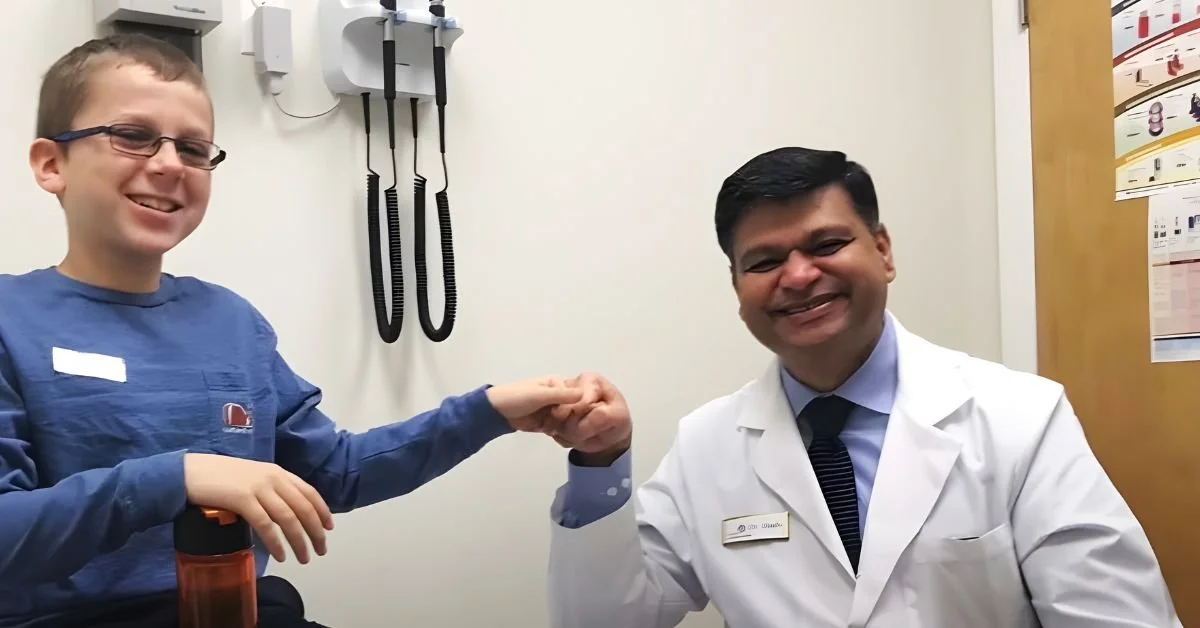Food Allergy
Symptoms and Causes
A comprehensive guide to understanding food allergy symptoms and causes, including mild vs. severe reactions, common triggers, and the role of the immune system. At NY Food Allergy & Wellness, Dr. Atul Shah's FATE™ Program helps manage and desensitize food allergies for greater food freedom.
SUCCESS
STORIES
20+
30+
YEARS OF
EXPERIENCE
ALLERGENS
TREATED
Food Allergy
Symptoms and Causes
A comprehensive guide to understanding food allergy symptoms and causes, including mild vs. severe reactions, common triggers, and the role of the immune system. At NY Food Allergy & Wellness, Dr. Atul Shah's FATE™ Program helps manage and desensitize food allergies for greater food freedom.
20+
30+
SUCCESS
STORIES
YEARS OF
EXPERIENCE
ALLERGENS
TREATED
What Are Food Allergy Symptoms?
Food allergies occur when the immune system mistakenly identifies harmless food proteins as threats, triggering an overreaction. Symptoms can range from mild discomfort to life-threatening emergencies, often appearing within minutes to hours after exposure.
Mild Symptoms: These typically affect one body system and include itchy or runny nose, sneezing, tingling or itching in the mouth, a few hives, mild skin itching, or mild nausea/discomfort. They may resemble hay fever or minor irritations.
Severe Symptoms (Anaphylaxis): Involving multiple body systems, these can include widespread hives, shortness of breath, wheezing, repetitive cough, pale or faint appearance, throat tightness, hoarse voice, trouble breathing/swallowing, abdominal cramps, diarrhea, vomiting, swelling of the tongue/lips/throat, blood pressure changes, or a sense of impending doom. Anaphylaxis requires immediate medical attention.
Food allergy symptoms in adults may differ from children, with adults more likely to experience oral symptoms or gastrointestinal issues. Eczema from food allergy can manifest as itchy, inflamed skin rashes, often linked to triggers like dairy or eggs.
| Symptom Type | Mild Examples | Severe Examples (Anaphylaxis) |
|---|---|---|
| Skin | Few hives, mild itching | Widespread hives, swelling of lips/tongue |
| Respiratory | Itchy/runny nose, sneezing | Shortness of breath, wheezing, throat tightness |
| Gastrointestinal | Mild nausea, mouth tingling | Abdominal cramps, vomiting, diarrhea |
| Systemic | None or minimal | Pale/faint, low blood pressure, sense of doom |
What Causes Food Allergies?
Food allergy causes involve a complex interplay of genetics, environment, and immune function. The immune system plays a central role by producing IgE antibodies that mistakenly target food proteins, leading to histamine release and inflammation.
Immune System Role: In allergic individuals, the body creates specific IgE antibodies to fight perceived threats from foods, affecting skin, respiratory, digestive, or cardiovascular systems.
Hygiene Hypothesis: This theory suggests that overly sanitized modern lifestyles limit early exposure to microbes, hindering the immune system's ability to distinguish harmless substances. Reduced infections, antibiotic use, and altered gut microbiomes may contribute to rising prevalence.
Other Causes: Genetic predisposition (family history increases risk), environmental factors like pollution or urbanization, dietary shifts (high processed foods, low fresh produce), and disruptions in gut bacteria. Food allergy causes in adults often stem from childhood allergies persisting or new sensitizations.
The difference between food allergy and intolerance: Allergies involve the immune system (IgE-mediated, potentially severe), while intolerances affect digestion (e.g., lactose intolerance from enzyme deficiency) and are not life-threatening.
Why Food Allergy Awareness Matters
Food allergies affect over 20 million Americans, with 1 in 13 children impacted—a 50% increase since 2007. Awareness is vital to prevent accidental exposures, reduce emergency visits, and improve quality of life. Early recognition of symptoms like food allergy rash or anaphylaxis symptoms can save lives.
Global prevalence is rising due to factors like the hygiene hypothesis, making education essential. At NY Food Allergy & Wellness, we promote awareness through Dr. Atul Shah's FATE™ Program, empowering families with knowledge and personalized care.
For related conditions, see our page on FPIES.
Common Triggers & Allergens in Food Allergies
The Big 9 allergens account for 90% of reactions in the U.S., as identified by the FDA.
Milk: Common in infants; causes cow's milk allergy with symptoms like hives or vomiting.
Eggs: Often outgrown; triggers range from mild rash to severe reactions.
Peanuts: One of the most common and severe, linked to anaphylaxis.
Tree Nuts: Includes almonds, walnuts, cashews; addresses most common tree nut allergies.
Wheat: Can cause eczema or gastrointestinal issues.
Soy: Frequent in processed foods; milder for many.
Fish and Shellfish: Often persists into adulthood; includes shrimp, shellfish allergy.
Sesame: Newly added; emerging trigger in seeds and oils.
Diagnosis & Eligibility for
Food Allergy Desensitization
Accurate diagnosis is key to effective management.
Clinical History and Testing: Review symptoms, family history, skin-prick tests, or IgE blood panels to identify triggers.
Oral Food Challenge (OFC): Supervised ingestion to confirm reactions.
Advanced Testing: Basophil Activation Test (BAT)—NY Food Allergy & Wellness is the only certified lab in NYS for this precise method.
Age Considerations: Symptoms can start in infants; adults may develop new ones.
Eligibility for treatments like OIT depends on confirmed allergies and health status.
Management & Treatment for Food Allergies
Managing food allergies focuses on avoidance, preparedness, and desensitization.
Avoidance Strategies: Read labels, avoid cross-contamination, use allergy-friendly recipes.
Emergency Response: Carry epinephrine auto-injectors; recognize anaphylaxis symptoms.
Our FATE™ Program: Led by Dr. Atul Shah, this 5-phase program at NY Food Allergy & Wellness offers customized desensitization for Big 9 allergens. With 15,000+ success stories, it includes OIT or SLIT based on preference, leading from bite-proof to free eating.
Link to more: Food Allergy Treatments
Food Allergy Effectiveness
and Prevention
Does early intervention work? Yes, guidelines like the LEAP study support introducing allergens early to prevent development. The FATE™ Program has proven effective in desensitization.
Research Insights: Hygiene hypothesis and gut health studies highlight prevention potential.
Pros and Cons: Awareness reduces risks; challenges include constant vigilance.
Food Allergy Risks and Side Effects
Untreated allergies pose risks like anaphylaxis.
Common Reactions: From mild hives to severe swelling.
Serious Concerns: Eczema flares, gastrointestinal distress, or life-threatening episodes.
Mitigation: Supervised challenges and personalized plans minimize dangers.
Dr. Atul Shah:
Pioneering Food Allergy
Treatments in Manhattan.
Dr. Atul Shah, MD, FACAAI, FAAAAI, is the founder of NY Food Allergy & Wellness and a renowned allergist with over 20 years of experience. With more than 15,000 success stories across children, teens, and adults, Dr. Shah’s expertise knows no age limits. He holds dual fellowships and has been honored with prestigious awards, including America’s Top Physician. Dr. Shah is a leader in allergy care, offering personalized, life-changing treatments for all ages.
Dr. Atul Shah, MD, FACAAI, FAAAAI, is the founder of NY Food Allergy & Wellness & a renowned allergist with over 20 years of experience. With more than 15,000 success stories across children, teens, & adults, Dr. Shah’s expertise knows no age limits. He holds dual fellowships & has been honored with prestigious awards, including America’s Top Physician. Dr. Shah is a leader in allergy care, offering personalized, life-changing treatments.
Why One-on-One Care at NYFA
Outshines Larger Institutions
NY Food Allergy & Wellness, the best food allergy institution, offers a private practice experience that sets us apart. Our clients from the Upper East Side, Scarsdale, and Roslyn benefit from:
Discretion and Privacy: A quiet, upscale environment ensures your care remains confidential.
Tailored Treatment Plans: Every step of the FATE™ Program is customized to your unique needs.
Direct Access to Expertise: Work closely with Dr. Shah, benefiting from over 20 years of experience and 15,000 success stories.
Onsite Testing: Needed skin tests and blood tests are arranged onsite while you are in the office. We’re the only CLIA-certified and DOH-approved Basophil Activation Test (BAT) lab in New York State, offering cutting-edge diagnostics to get an accurate diagnosis unavailable elsewhere.
Food Oral Challenges, SLIT, OIT in Exclusive and Private Setting: Everything needed is done safely in a child and adult friendly environment in an exclusive private setting.
Food Allergy Symptoms FAQ
-
mistakenly treating harmless food proteins as threats, leading to an overreaction. Genetic factors, such as family history, increase risk, while environmental influences like limited early exposure to microbes (hygiene hypothesis) contribute to rising cases. Common triggers include the Big 9 allergens like peanuts, milk, eggs, and tree nuts. At NY Food Allergy & Wellness, Dr. Atul Shah's FATE™ Program assesses these causes through a deep dive into medical history in phase 1, using exclusive methods like the Basophil Activation Test (the only certified lab in NYS), to customize desensitization plans for allergens like peanuts or milk, helping over 15,000 patients achieve food freedom.
-
The body naturally processes and eliminates food allergens over time, so focus on managing symptoms and avoiding further exposure. Stay hydrated with fluids, and for mild reactions, consider over-the-counter antihistamines or soothing remedies like ginger tea. Severe reactions need immediate epinephrine and medical care. At NY Food Allergy & Wellness, the FATE™ Program guides patients on symptom management and desensitization options like OIT or SLIT, determined after phase 1 evaluations including Oral Food Challenges, to reduce future reactions and promote bite-proof to free eating.
-
Sudden food allergies in adults can arise from immune system shifts, new environmental exposures like pollution, or genetic factors activating later in life. Repeated contact with foods such as shellfish or hormonal changes may also play a role. At NY Food Allergy & Wellness, Dr. Atul Shah's FATE™ Program helps identify these triggers through comprehensive phase 1 assessments, including the exclusive Basophil Activation Test in NYS, to tailor OIT or SLIT protocols for allergens like tree nuts or shellfish, supporting over 15,000 success stories toward desensitization.
-
Food allergy symptoms vary from mild issues like mouth tingling, hives, or nausea to severe anaphylaxis with swelling, wheezing, cramps, vomiting, low blood pressure, or a sense of doom, often starting within minutes to hours. At NY Food Allergy & Wellness, the FATE™ Program evaluates symptoms in phase 1 with tools like Oral Food Challenges and BAT testing (NYS exclusive), guiding personalized desensitization via OIT or SLIT to minimize reactions and enable free eating for thousands of patients.
-
Food intolerance signs mainly involve digestion, such as bloating, gas, diarrhea, nausea, heartburn, headaches, fatigue, or a runny nose, appearing hours after eating without immune involvement or life-threatening risks. At NY Food Allergy & Wellness, distinguishing intolerances from allergies is key in the FATE™ Program's phase 1 review, using advanced diagnostics like BAT (only in NYS) to recommend avoidance strategies or treatments, helping patients navigate symptoms effectively.
-
Food allergens are usually cleared by the body in hours to a couple of days, based on digestion and metabolism; mild symptoms may fade quickly, while severe ones can linger if untreated. Timelines vary case by case. At NY Food Allergy & Wellness, the FATE™ Program monitors allergen responses through phase 1 testing, including Oral Food Challenges and exclusive BAT in NYS, to develop OIT or SLIT plans that build tolerance over time, reducing how long reactions affect daily life for our 15,000+ success stories.

The Gold Standard in Food Allergy Diagnosis:
The FATE™ Program at NY Food Allergy & Wellness
Start Your Journey to Food Allergy Freedom Today
Ready to take control of your food allergies? Connect with Dr. Atul Shah to begin your journey. Schedule a telehealth consultation or in-person visit with NY Food Allergy & Wellness to explore the FATE™ Program and start building tolerance to your allergens. With at-home testing, personalized plans, and expert guidance, food allergy desensitization has never been more accessible.
Don’t let food allergies hold you back. Take the first step toward a life without fear—contact us today!

Dr. Atul Shah’s FATE™ Program has helped over 15,000 patients, offering a proprietary, one-on-one approach that stands apart from larger institutions. As New York’s only certified BAT allergy lab, our DOH-approved, CLIA-certified facility provides unique insights that others don’t, allowing for more precise desensitization for children, teens, and adults—even into their 50s. This private practice model ensures personalized care, helping patients regain confidence in their lives, careers, & overall well-being.
What our patients are saying...
About Dr. Atul Shah: Testimonials
Dr. Shah Interview with Donna Drake
Food Allergy Success: Cameron
































